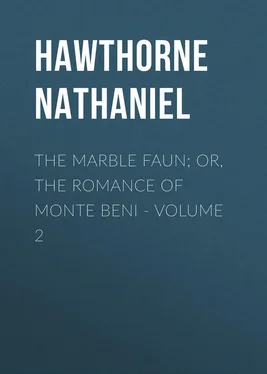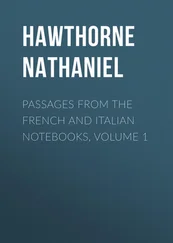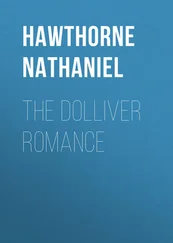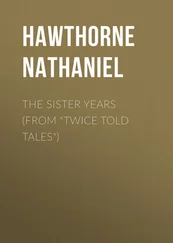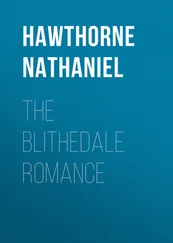Nathaniel Hawthorne - The Marble Faun; Or, The Romance of Monte Beni - Volume 2
Здесь есть возможность читать онлайн «Nathaniel Hawthorne - The Marble Faun; Or, The Romance of Monte Beni - Volume 2» — ознакомительный отрывок электронной книги совершенно бесплатно, а после прочтения отрывка купить полную версию. В некоторых случаях можно слушать аудио, скачать через торрент в формате fb2 и присутствует краткое содержание. Жанр: literature_19, foreign_antique, foreign_prose, на английском языке. Описание произведения, (предисловие) а так же отзывы посетителей доступны на портале библиотеки ЛибКат.
- Название:The Marble Faun; Or, The Romance of Monte Beni - Volume 2
- Автор:
- Жанр:
- Год:неизвестен
- ISBN:нет данных
- Рейтинг книги:3 / 5. Голосов: 1
-
Избранное:Добавить в избранное
- Отзывы:
-
Ваша оценка:
- 60
- 1
- 2
- 3
- 4
- 5
The Marble Faun; Or, The Romance of Monte Beni - Volume 2: краткое содержание, описание и аннотация
Предлагаем к чтению аннотацию, описание, краткое содержание или предисловие (зависит от того, что написал сам автор книги «The Marble Faun; Or, The Romance of Monte Beni - Volume 2»). Если вы не нашли необходимую информацию о книге — напишите в комментариях, мы постараемся отыскать её.
The Marble Faun; Or, The Romance of Monte Beni - Volume 2 — читать онлайн ознакомительный отрывок
Ниже представлен текст книги, разбитый по страницам. Система сохранения места последней прочитанной страницы, позволяет с удобством читать онлайн бесплатно книгу «The Marble Faun; Or, The Romance of Monte Beni - Volume 2», без необходимости каждый раз заново искать на чём Вы остановились. Поставьте закладку, и сможете в любой момент перейти на страницу, на которой закончили чтение.
Интервал:
Закладка:
The young Count accorded his guest full liberty to investigate the personal annals of these pictured worthies, as well as all the rest of his progenitors; and ample materials were at hand in many chests of worm-eaten papers and yellow parchments, that had been gathering into larger and dustier piles ever since the dark ages. But, to confess the truth, the information afforded by these musty documents was so much more prosaic than what Kenyon acquired from Tomaso’s legends, that even the superior authenticity of the former could not reconcile him to its dullness. What especially delighted the sculptor was the analogy between Donatello’s character, as he himself knew it, and those peculiar traits which the old butler’s narrative assumed to have been long hereditary in the race. He was amused at finding, too, that not only Tomaso but the peasantry of the estate and neighboring village recognized his friend as a genuine Monte Beni, of the original type. They seemed to cherish a great affection for the young Count, and were full of stories about his sportive childhood; how he had played among the little rustics, and been at once the wildest and the sweetest of them all; and how, in his very infancy, he had plunged into the deep pools of the streamlets and never been drowned, and had clambered to the topmost branches of tall trees without ever breaking his neck. No such mischance could happen to the sylvan child because, handling all the elements of nature so fearlessly and freely, nothing had either the power or the will to do him harm.
He grew up, said these humble friends, the playmate not only of all mortal kind, but of creatures of the woods; although, when Kenyon pressed them for some particulars of this latter mode of companionship, they could remember little more than a few anecdotes of a pet fox, which used to growl and snap at everybody save Donatello himself.
But they enlarged — and never were weary of the theme — upon the blithesome effects of Donatello’s presence in his rosy childhood and budding youth. Their hovels had always glowed like sunshine when he entered them; so that, as the peasants expressed it, their young master had never darkened a doorway in his life. He was the soul of vintage festivals. While he was a mere infant, scarcely able to run alone, it had been the custom to make him tread the winepress with his tender little feet, if it were only to crush one cluster of the grapes. And the grape-juice that gushed beneath his childish tread, be it ever so small in quantity, sufficed to impart a pleasant flavor to a whole cask of wine. The race of Monte Beni — so these rustic chroniclers assured the sculptor — had possessed the gift from the oldest of old times of expressing good wine from ordinary grapes, and a ravishing liquor from the choice growth of their vineyard.
In a word, as he listened to such tales as these, Kenyon could have imagined that the valleys and hillsides about him were a veritable Arcadia; and that Donatello was not merely a sylvan faun, but the genial wine god in his very person. Making many allowances for the poetic fancies of Italian peasants, he set it down for fact that his friend, in a simple way and among rustic folks, had been an exceedingly delightful fellow in his younger days.
But the contadini sometimes added, shaking their heads and sighing, that the young Count was sadly changed since he went to Rome. The village girls now missed the merry smile with which he used to greet them.
The sculptor inquired of his good friend Tomaso, whether he, too, had noticed the shadow which was said to have recently fallen over Donatello’s life.
“Ah, yes, Signore!” answered the old butler, “it is even so, since he came back from that wicked and miserable city. The world has grown either too evil, or else too wise and sad, for such men as the old Counts of Monte Beni used to be. His very first taste of it, as you see, has changed and spoilt my poor young lord. There had not been a single count in the family these hundred years or more, who was so true a Monte Beni, of the antique stamp, as this poor signorino; and now it brings the tears into my eyes to hear him sighing over a cup of Sunshine! Ah, it is a sad world now!”
“Then you think there was a merrier world once?” asked Kenyon.
“Surely, Signore,” said Tomaso; “a merrier world, and merrier Counts of Monte Beni to live in it! Such tales of them as I have heard, when I was a child on my grandfather’s knee! The good old man remembered a lord of Monte Beni — at least, he had heard of such a one, though I will not make oath upon the holy crucifix that my grandsire lived in his time who used to go into the woods and call pretty damsels out of the fountains, and out of the trunks of the old trees. That merry lord was known to dance with them a whole long summer afternoon! When shall we see such frolics in our days?”
“Not soon, I am afraid,” acquiesced the sculptor. “You are right, excellent Tomaso; the world is sadder now!”
And, in truth, while our friend smiled at these wild fables, he sighed in the same breath to think how the once genial earth produces, in every successive generation, fewer flowers than used to gladden the preceding ones. Not that the modes and seeming possibilities of human enjoyment are rarer in our refined and softened era, — on the contrary, they never before were nearly so abundant, — but that mankind are getting so far beyond the childhood of their race that they scorn to be happy any longer. A simple and joyous character can find no place for itself among the sage and sombre figures that would put his unsophisticated cheerfulness to shame. The entire system of man’s affairs, as at present established, is built up purposely to exclude the careless and happy soul. The very children would upbraid the wretched individual who should endeavor to take life and the world as w what we might naturally suppose them meant for — a place and opportunity for enjoyment.
It is the iron rule in our day to require an object and a purpose in life. It makes us all parts of a complicated scheme of progress, which can only result in our arrival at a colder and drearier region than we were born in. It insists upon everybody’s adding somewhat — a mite, perhaps, but earned by incessant effort — to an accumulated pile of usefulness, of which the only use will be, to burden our posterity with even heavier thoughts and more inordinate labor than our own. No life now wanders like an unfettered stream; there is a mill-wheel for the tiniest rivulet to turn. We go all wrong, by too strenuous a resolution to go all right.
Therefore it was — so, at least, the sculptor thought, although partly suspicious of Donatello’s darker misfortune — that the young Count found it impossible nowadays to be what his forefathers had been. He could not live their healthy life of animal spirits, in their sympathy with nature, and brotherhood with all that breathed around them. Nature, in beast, fowl, and tree, and earth, flood, and sky, is what it was of old; but sin, care, and self-consciousness have set the human portion of the world askew; and thus the simplest character is ever the soonest to go astray.
“At any rate, Tomaso,” said Kenyon, doing his best to comfort the old man, “let us hope that your young lord will still enjoy himself at vintage time. By the aspect of the vineyard, I judge that this will be a famous year for the golden wine of Monte Beni. As long as your grapes produce that admirable liquor, sad as you think the world, neither the Count nor his guests will quite forget to smile.”
“Ah, Signore,” rejoined the butler with a sigh, “but he scarcely wets his lips with the sunny juice.”
“There is yet another hope,” observed Kenyon; “the young Count may fall in love, and bring home a fair and laughing wife to chase the gloom out of yonder old frescoed saloon. Do you think he could do a better thing, my good Tomaso?”
Читать дальшеИнтервал:
Закладка:
Похожие книги на «The Marble Faun; Or, The Romance of Monte Beni - Volume 2»
Представляем Вашему вниманию похожие книги на «The Marble Faun; Or, The Romance of Monte Beni - Volume 2» списком для выбора. Мы отобрали схожую по названию и смыслу литературу в надежде предоставить читателям больше вариантов отыскать новые, интересные, ещё непрочитанные произведения.
Обсуждение, отзывы о книге «The Marble Faun; Or, The Romance of Monte Beni - Volume 2» и просто собственные мнения читателей. Оставьте ваши комментарии, напишите, что Вы думаете о произведении, его смысле или главных героях. Укажите что конкретно понравилось, а что нет, и почему Вы так считаете.
